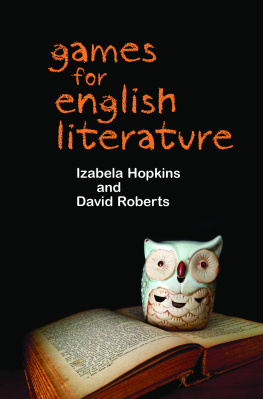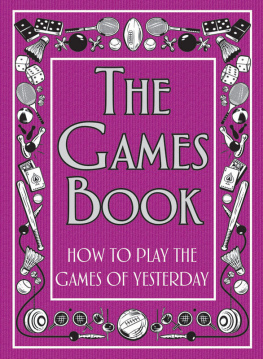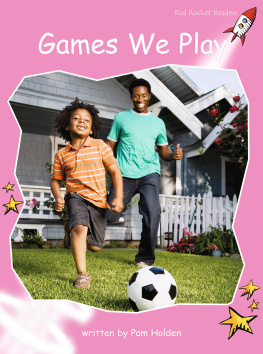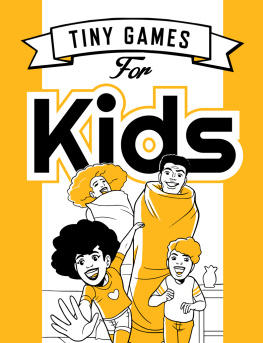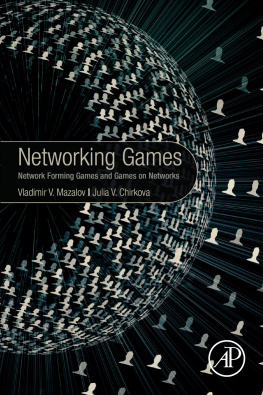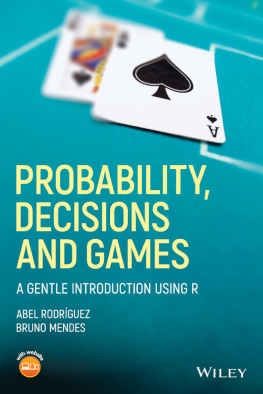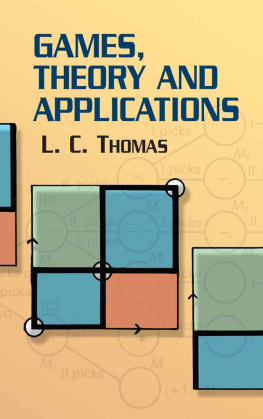Hopkins Izabela - Games for English Literature
Here you can read online Hopkins Izabela - Games for English Literature full text of the book (entire story) in english for free. Download pdf and epub, get meaning, cover and reviews about this ebook. City: Oxfordshire, year: 2016, publisher: Libri Publishing, genre: Home and family. Description of the work, (preface) as well as reviews are available. Best literature library LitArk.com created for fans of good reading and offers a wide selection of genres:
Romance novel
Science fiction
Adventure
Detective
Science
History
Home and family
Prose
Art
Politics
Computer
Non-fiction
Religion
Business
Children
Humor
Choose a favorite category and find really read worthwhile books. Enjoy immersion in the world of imagination, feel the emotions of the characters or learn something new for yourself, make an fascinating discovery.
- Book:Games for English Literature
- Author:
- Publisher:Libri Publishing
- Genre:
- Year:2016
- City:Oxfordshire
- Rating:4 / 5
- Favourites:Add to favourites
- Your mark:
- 80
- 1
- 2
- 3
- 4
- 5
Games for English Literature: summary, description and annotation
We offer to read an annotation, description, summary or preface (depends on what the author of the book "Games for English Literature" wrote himself). If you haven't found the necessary information about the book — write in the comments, we will try to find it.
Games for English Literature — read online for free the complete book (whole text) full work
Below is the text of the book, divided by pages. System saving the place of the last page read, allows you to conveniently read the book "Games for English Literature" online for free, without having to search again every time where you left off. Put a bookmark, and you can go to the page where you finished reading at any time.
Font size:
Interval:
Bookmark:
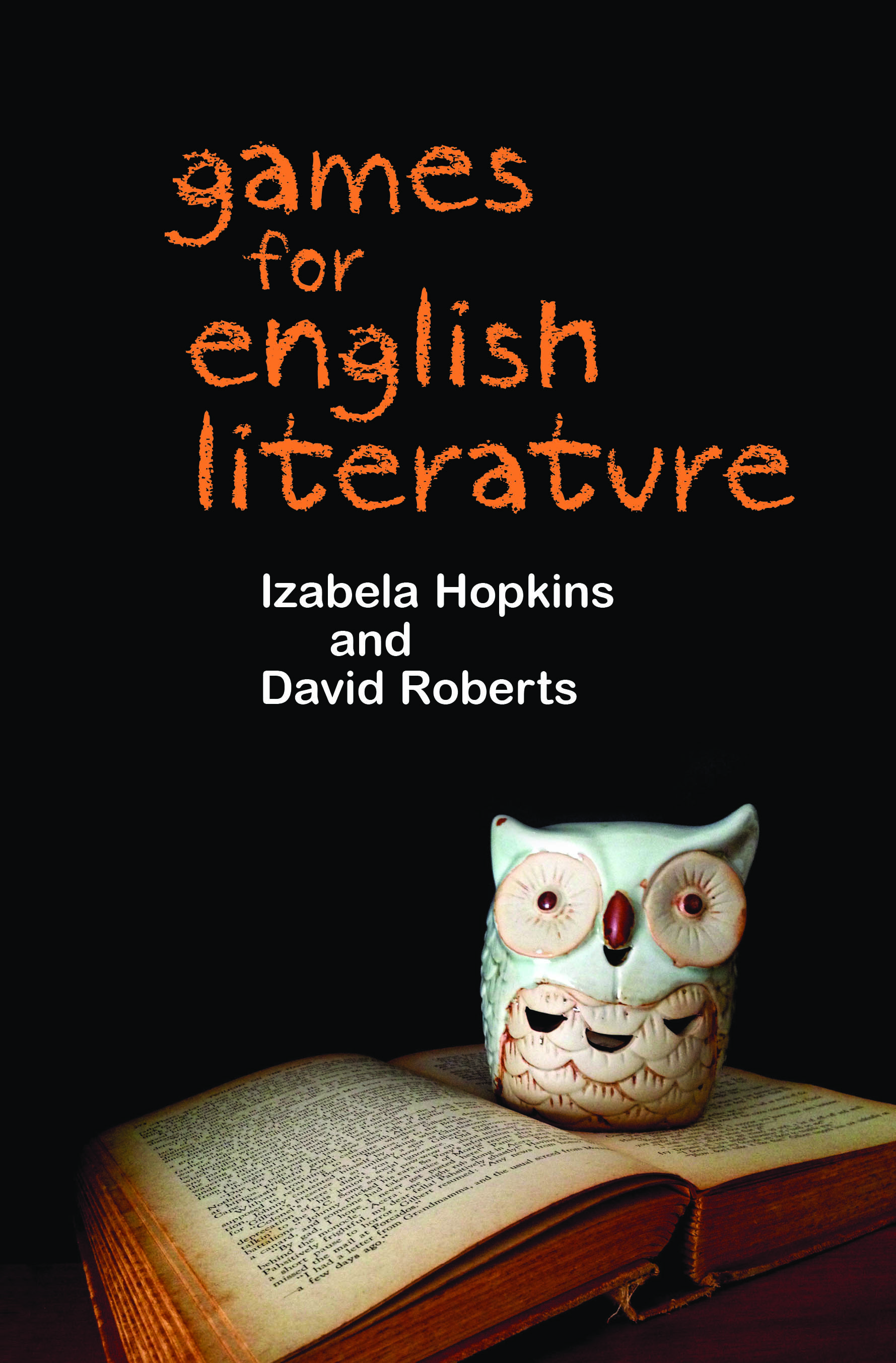
GAMES FOR ENGLISH LITERATURE
Izabela Hopkins and David Roberts
First published in 2016 by Libri Publishing
Copyright Libri Publishing
Authors retain copyright of individual chapters.
The right of Izabela Hopkins and David Roberts to be identified as the authors of this work has been asserted in accordance with the Copyright, Designs and Patents Act, 1988.
print ISBN 978-1-909818-89-7
epdf ISBN 978-1-909818-97-2
epub ISBN 978-1-909818-98-9
mobi ISBN 978-1-909818-99-6
All rights reserved. No part of this publication may be reproduced, stored in any retrieval system or transmitted in any form or by any means, electronic, mechanical, photocopying, recording or otherwise, without the prior written permission of the copyright holder for which application should be addressed in the first instance to the publishers. No liability shall be attached to the author, the copyright holder or the publishers for loss or damage of any nature suffered as a result of reliance on the reproduction of any of the contents of this publication or any errors or omissions in its contents.
A CIP catalogue record for this book is available from The British Library
Design and cover by Carnegie Book Production
Libri Publishing
Brunel House
Volunteer Way
Faringdon
Oxfordshire
SN7 7YR
Tel: +44 (0)845 873 3837
www.libripublishing.co.uk
Contents
Izabela Hopkins obtained her PhD from Birmingham City University on the subject of whiteness in American fiction. Her teaching and research interests include literary theory and the intersections between literature, identity and place. She is a Visiting Lecturer in the School of English at Birmingham City University and in the Institute of Humanities and Creative Arts at University of Worcester.
David Roberts is Professor of English and Dean of the Arts, Design and Media at Birmingham City University. A widely published theatre historian and literary critic, his recent books include Restoration Plays and Players and Thomas Betterton , both for Cambridge University Press. He also writes programme essays for the Royal Opera House and in 2013 was awarded a National Teaching Fellowship by the UK Higher Education Academy.
We would like to thank the students of Birmingham City University who have played some of our games. Gareth Courage has worked with us on materials for a high-concept board game called Monstrosity which we hope will see the light of day soon. David Robertss award of a National Teaching Fellowship and Innovative Pedagogies Funding from the UK Higher Education Academy made it possible to undertake the research for this book. Special thanks go to Fiona Shaw Roberts and Dee Gough.
Theory
Learning combined with diversion has a very different effect from instruction. Faced with a range of games, the student becomes more ready to engage, to derive amusement from the very process of learning. In a state that could be described as good humour, the student begins to learn without any obstacles of duress or reluctance.
You might imagine those are the words of a contemporary learning and teaching guru celebrating the role of e-games in the curriculum: a vividly post-chalk-and-talk call to pedagogic arms. In fact, they are a translation of ideas set to paper in 1777 by a Polish writer called Micha Dymitr Tadeusz Krajewski. In his compendiously entitled book, Educational games for children serving to facilitate their education, through which they can easily learn letters, spelling, reading in Polish and French, writing, history, geography and rudimentary arithmetic, and have their character formed , Krajewski set out to show that games, far from being a frivolous distraction the thing that starts in the breaks when learning stops are a teachers greatest asset.
So, the idea that games promote learning is a longstanding one. Engaging, competitive and goal-oriented, they provide students with the chance to learn through doing, and teachers with a heaven-sent opportunity to set tasks that are fun to complete on their own terms. Enjoyment of play is part of being human, a diversion that enhances the cognitive potential of the player, promoting an active approach to learning whereby students learn by doing. Games, Krajewski argued, could be adapted to suit the age of the learner, and the scholar-friendly atmosphere created by an environment of play serves to counteract the relative tedium of more established methods.
Since Krajewski, of course, the technology of games has moved on. Now, many academics who write about games pedagogy are concerned with multiplying literacies. In a world where the printed book is challenged by hand-held devices, X-Boxes and PlayStations, how are we to balance the competing demands and attractions of such different platforms? What counts as literacy now? And how can the use of games so often the product of new technologies help us to improve teaching when the world is awash with them? Its a question largely avoided by most teachers of English Literature, who have resisted using games partly because there is a natural playfulness in the acts of reading and interpretation, and partly because there is an abundance of published material on how to use creative activities in the English classroom. But creative activities do not have the same elements of fun and competition that have made games so attractive to educators since Tadeusz Krajewski. There is no reason why games cannot be used to stimulate an interest in the core concerns of English Literature.
To some, the effort would be pointless. Some writers go as far as to argue that we should abandon the traditional English curriculum of more or less canonical texts and focus instead on the language interactions stimulated by Grand Theft Auto or World of Warcraft. Others focus on the way digital animation and other graphic narratives offer space to critique the strategies people use to make sense of Treasure Island or Noughts and Crosses. There is a prevailing tendency among people who write about games to view them under the sign of what is now called literacy studies.
That field is a stroke of the pen away from the focus of this book, which you might say is radically traditional in two ways. Our interest is in literary studies: in the understanding, that is, of how (mostly) printed narratives, poems and plays are formed, structured, contextualized and interpreted. As far as games are concerned, were not particularly interested in hi-tech immersive software, which is expensive to design and relatively short in lifespan. Instead, we give prominence to games that can be played with relatively simple materials: sets of cards, dice, boards, and so on.
But none of our games is an end in itself. Their purpose is not to reveal some pre-existing set of data or answers. Like the study of literature, they are designed as provocations to discovery, to independent and collective thought, to a more sophisticated grasp and use of language. In his great book of 1938, Homo Ludens, the social historian Johan Huizinga concluded that the evolution of the game was crucially linked to the development of civic institutions. In the rhetorical curriculum of Renaissance grammar schools sat the principle that games were an expression of verbal mastery, enjoyable but completely non-trivial, and anything but pre-determined in their outcome. For more detail on the philosophical justification for our approach here, we refer you to an article weve published in the 2015 volume of the journal Changing English .
The games in this book are designed to be adaptable to different levels of study. Some are more likely to appeal more to A level students than to undergraduates, and vice versa. They draw on a common stock of materials that can be bought and adapted at little cost, and in some cases they map directly onto the kind of questions that typically get asked when students face assessment. Many of the games can be played without a teacher being present, although many also assume that someone will be there to draw together threads of discussion. If nothing else, experience tells us that these games are a great way of overcoming that horrible problem, the wall of silence, that confronts every teacher of literature at some stage in his or her career. We hope that you and your students find these games a great stimulus to engagement, argument and understanding.
Font size:
Interval:
Bookmark:
Similar books «Games for English Literature»
Look at similar books to Games for English Literature. We have selected literature similar in name and meaning in the hope of providing readers with more options to find new, interesting, not yet read works.
Discussion, reviews of the book Games for English Literature and just readers' own opinions. Leave your comments, write what you think about the work, its meaning or the main characters. Specify what exactly you liked and what you didn't like, and why you think so.

